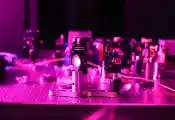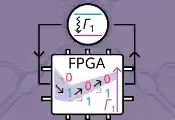With NSF Grant, Yale and Industry Team Up to Harness Quantum’s Potential
December 19, 2024 -- A Yale-led project that aims to develop quantum technology into practical applications has been awarded a prestigious grant from the National Science Foundation (NSF).
Erasure Qubits and Dynamic Circuits for Quantum Advantage (ERASE), a pilot project led by Yale physicist Steven Girvin, is a collaboration between academia and an industrial hardware partner, Quantum Circuits, Inc. (QCI), a Connecticut-based company that aims to bring to market the first practical quantum computers.
It is one of six projects to receive awards from the NSF this week. These, along with five others that received NSF awards in August, are collectively supported by the NSF National Quantum Virtual Laboratory (NQVL) initiative, an ambitious effort to accelerate the development of quantum technologies by providing researchers anywhere in the United States with access to specialized resources. Each pilot project will receive $1 million over 12 months to create conceptual designs for real-world testing environments to further the progress of quantum-related technologies.
While Quantum computers have the potential to revolutionize information processing, the ERASE team is addressing a key challenge in the development of the technology. Specifically, current hardware is very prone to errors.
The ERASE team aims to resolve this by developing an innovative quantum computing platform. It features specially designed qubits — the units of information in quantum computing — known as “erasure flag” qubits. The technology is based in part on the research of Shruti Puri, assistant professor of physics and applied physics, and Robert Schoelkopf, Sterling Professor of Applied Physics. Like Girvin, both are faculty members at the Yale School of Engineering & Applied Science and Yale’s Faculty of Arts and Sciences.
“Erasure qubits are special qubits that put up a flag that tells you ‘The error happened at this particular spot at this particular time,’” said Girvin.
Yale and state officials noted that the project helps advance the goals of QuantumCT, a unique private-public partnership led by Yale and the University of Connecticut created to accelerate quantum research and to position the state as a global quantum technology hub.
As of last spring, QuantumCT has awarded one-year seed grants to nine Connecticut-based research groups for exploratory quantum projects, each aiming to tackle a “challenge problem” issued by corporate partners in the state. The projects are directly relevant to Connecticut industries, including aerospace, biotech, and life sciences.
The new NSF grant will support what is considered the planning phase of the projects. The ultimate goal, which goes beyond the scope of this grant, is to build a computer based on this technology.
“We are building a quantum error correction testbed as part of a national quantum virtual laboratory,” Girvin said. “That means people will be able to remotely access this instrument online and experiment with it, make it better, modify the software stack, develop new algorithms, et cetera.”
“We’re going to hold three workshops to get the community of researchers nationally engaged in the project,” Girvin said. “We’re trying to build a novel form of error-corrected quantum computer with a hardware design that’s very different from conventional quantum technology, and we need to get computer scientists and people with other expertise interested in learning how to build compilers, operating systems, and new error-correction protocols so we can perform efficient computations on this hardware.”
Another major component of the project is figuring out how to scale up the technology. That’s where Quantum Circuits, Inc. comes in. Focusing on the hardware aspect of the project, the Connecticut-based company will provide researchers with access to this new computational paradigm.
“This project is a great example of how leaders in the private sector and academia can enable quantum computing’s innovation and future impact on the world,” said Ray Smets, CEO and president of Quantum Circuits, Inc. “Our relationship with Yale is deep. Much of the quantum industry’s roots originate from our partnership. This grant is the latest step in driving research that will result in real-world quantum applications for commercial industries and economies.”
Other partners in the project include Virginia Polytechnic Institute, University of Maryland, Princeton University, North Carolina Agricultural and Technical State University, RTX Technology Research Center, NVIDIA, Quantinuum, JPMorgan Chase & Co., and Amazon Web Services.




































